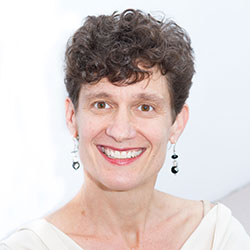Jenny Zapf Arrives at GSE to Lead the Nation’s First M.S. Ed. Education Entrepreneurship Program
July 11, 2014 — The world of education is undergoing a revolution.
Technology is transforming long-held ideas about what can happen in a classroom, and even what a classroom can be. Experienced educators are seeing opportunities to reinvent how children are taught. Outsiders are bringing new ideas and energy into a field often defined by tradition.
Before these emerging leaders can make a lasting impact, they will have to overcome practical problems: business models, legal complexities, staffing, marketing, and financial realities.
By starting the first M.S.Ed. program in Education Entrepreneurship, Penn GSE is giving innovators the tools to put their ideas into practice. Dr. Jenny Zapf, the program’s new director, knows how to make that happen.
In more than 25 years in education, Zapf has run an education nonprofit, done strategy work for higher education institutions, taught evaluations methods to programs across the country, worked on K-12 policy reform, conducted large-scale educational evaluations and worked in the field to improve schools.

She previously served as Chief Operating Officer for the Intergenerational Center at Temple University, a nationally recognized educational nonprofit led by Dr. Nancy Henkin that provided services to more than 15,000 Philadelphia residents. She has also worked with AmeriCorps, Learn and Serve, and Senior Corps leadership and practitioners on evaluating impact.
As a consultant, she managed a national education reform initiative at Penn to improve public school.
Zapf earned her Ph.D. in educational evaluation from the University of Virginia.
“I bring a diverse background in education, from running an education business, to designing, funding, and managing new school-based programs, teaching practitioners how to measure results, and providing technical assistance to nonprofit leaders in education,” Zapf said.
“My career has focused on using different, innovative strategies to improve educational and social outcomes, particularly for our most vulnerable kids.”
"That array of experiences allows Zapf to understand what students must learn to make breakthroughs in the education field," said Bobbi Kurshan, GSE’s Executive Director of Academic Innovation.
“Jenny was a perfect choice for the position as she has management, entrepreneurial, and academic credentials,” Kurshan said. “She will bring a unique perspective to the program and to the students.”
The first Education Entrepreneurship cohort of working professionals will begin studying this fall. The students are a mix of edtech innovators and educators looking to revive failing schools or start new ones. Applications have been submitted from across the United States as well as Ghana, Singapore, Hong Kong, and Indonesia.
Through the four-semester accelerated program, students will work with faculty from across Penn GSE and the university. In many ways, Zapf said, the program will serve as an incubator for students’ projects. The applied practicum and capstone requirements will allow students to develop a concept into a working product or model by the time they graduate.
“We have some really wonderful connections with both national and local education organizations and businesses,” Zapf said. “Through those networks, we’ll have opportunities for students to work in innovative environments at a pretty high level.”
In addition to overseeing the program, Zapf will be teaching the course “Evaluation of Policies, Programs, and Projects." She will also work closely with Kurshan and Martin Ihrig, the program’s academic director.
The chance to partner with Kurshan was a major draw for Zapf.
“Bobbi is on the leading edge of academic innovation,” Zapf said. “She brings tremendous knowledge, experience, energy, and enthusiasm that is rare to this work.”
Penn GSE is the perfect place to launch the first program to teach educational entrepreneurship, Zapf said.
“It’s an incredibly open field for change and its terrific to be at the forefront,” Zapf said. “We’re seeing so many new ideas and approaches, especially in school designs and the use of breakthrough technologies in education.”
The Education Entrepreneurship program will be accepting applicants for the first cohort through the summer.
